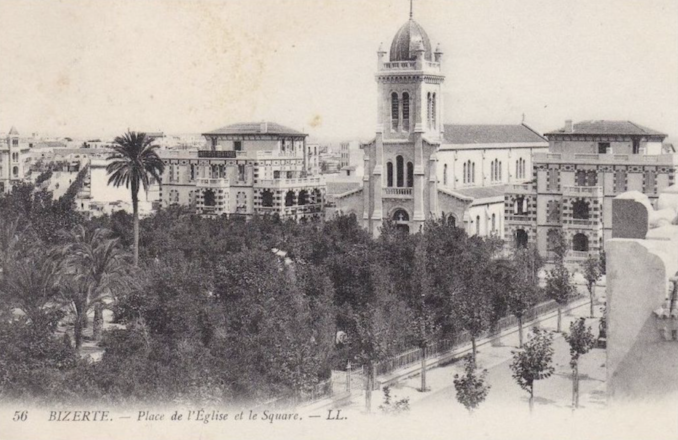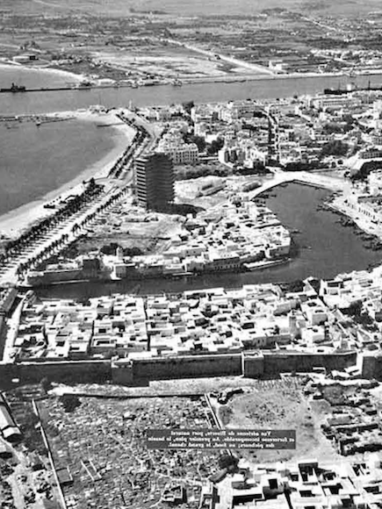“In the sixth of his articles John Alldridge writes of Bizerta, where a song was born, an Army vindicated itself, and a gigantic building plan went awry.” – Manchester Evening News, November 22 1949
Bizerta, Friday
There used to be a song about Bizerra, or Bizerte, as the French call it. A ribald song with innumerable verses, most of them unprintable.
It was composed by some anonymous American soldier somewhere around May, 1943.
When, in a slightly abridged form, it reached the United States via “The Stars and Stripes” it caused something of a sensation.
Hometown America was horrified. Local newspapers printed columns of protesting letters. Sermons were preached against it.
A snowball of public indignation rolled down on the unhappy Secretary of War. And a deputation of Congressmen caught the first plane to North Africa to inquire into the moral health of the troops.
Oddly enough I never heard it sung by the British soldier, whose own repertoire of Rabelaisian ditties is considerable.
But that was probably because this ditty was exclusively G.I. “Gerty” was born out of a mixed mood of exhilaration and relief.
For to the United States Army in Africa Bizerta was not just another badly damaged town captured by the Allies after hard fighting. It was more than that.
To the American soldier it represented a raison d’être. After Bizerta he felt that at last he had justified his existence.
Up till then the American Army had had little to sing about.
Its career had been that of any army rushed into action, well equipped but insufficiently trained, bursting with enthusiasm, brimming over with natural courage, but totally lacking in experience.
The Americans made all the natural mistakes. But unfortunately in a campaign like this, with men so thin on the ground, any one of those mistakes might have proved fatal.
At Tebourba right at the beginning their tanks had charged impetuously head-on and been blown to bits by the cleverly concealed German guns.
On Longstop they had been overrun.
In the Kasserine Pass they had allowed themselves first to be ambushed, then to be panicked out of their positions.
At Maknassy their transport got hopelessly tangled up.
At El Guettar they wiped out many of the black marks against them by fighting Rommel’s crack Mark IV tanks to a standstill.
And at Gafsa they were definitely on top for the first time, and their First American Division gave the Germans the fright of their lives.
To quote their new commander, General Patton, “We beat the living hell out of them.”
But then early in April, 1943, came the debacle at Fondouk. Their 34th Infantry Division was to share with the Welsh Guards an attack on the heights of the massive Djebel Trozza.
But they were late arriving and the attack went in without them. The result was that the Guards after taking their objective were cut to pieces.
After that they would not have been the men they were if they had not thirsted almost pathetically for a chance to rehabilitate themselves.
They got that chance in the advance on Bizerta. That advance became a breakthrough. In one day they forced the whole campaign a whole 24 hours ahead of schedule.
Bald and Green hills which had held us up for nearly six months fell before them. Then Mateur fell.
Then they were in the ugly pseudo-French provincial hamlet of Ferryville. And then, to show how quickly and how well they had profited from their earlier mistakes, they coolly sat down outside Bizerta and waited for the perfect moment to take it.
Later on in Tunis we found a German training pamphlet which showed how shrewdly and, as it turned out, how prophetically the enemy had summed up the Americans’ potentialities as a fighting man
“The British soldier is still the best in Africa. The Americans entered the war without any conception of its grimness and hardship. Once they learn this they will be very good soldiers indeed.”
After Bizerta there were no better soldiers anywhere than the men of the American First Infantry Division.
It was unfortunate, though, that Bizerta had to suffer for it. For suffer it did.

Vue de l’église Notre-Dame de France à Bizerte,
Editeurs de cartes postales Lévy & fils – Public domain
I doubt whether, for its size, any town anywhere during the war was so thoroughly and completely devastated as was Bizerta in the last days of April, 1943.
In a few terrible hours of precision bombing backed up by a deadly accurate cannonade more than half the buildings in this prosperous seaport were either destroyed totally or hopelessly damaged.
Every building of any size — the Town Hall, banks, railway station, palace —disappeared as if engulfed by an earthquake.
The magnificent harbour, third largest in all North Africa, was reduced to a village duckpond, choked with sunken shipping, its installations churned to rubble.
Of the 40,000 inhabitants in the European part of the town alone 15,000 were homeless.
No one, I suppose, will ever know the full extent of the damage in the ancient Arab quarter.
But somehow even in that ruin life had to go on.
I shall never forget the ghastly horror of Bizerta after dark as you picked your way back from the Allied Officers’ Club on the ruined promenade — the only building of any size that still boasted a roof — to the camp among the olive groves, a full two miles outside the town.
I quote just one paragraph from the diary I kept at that time:
“Between careering American trucks that leap out on you from the utter darkness and unfilled bomb craters, some of them fully a yard deep, you risk death every few yards. A silhouette by torch-light. A column of American negro soldiers shuffling back to barracks. Out of the blackness the voice of a sergeant, also coloured, “Now fellers yo all march to attention. And you, Abie Wells, take yo hands out of yo pockets. Ain’t yo got no manners?”
I don’t know what I expected to find when I returned six years afterwards.
I had heard that so complete was the destruction that Bizerta, like its ancient neighbour Carthage, would never be rebuilt.
And yet the fact is that you can stand and watch Bizerta visibly rising before your eyes.
I have never seen such ant-like impatience to get a job done. Even while I am writing this at a table in the Cafe Monopole, the largest in the town, a couple of workmen are hammering away at the wall above the bar while all around the card games and the domino playing goes on apparently undisturbed.
Already they tell me two-thirds of the European town is rebuilt. The port is open again. The magnificent promenade has been replanted with young palm trees.
In two years, they will have finished.

Vue aérienne de Bizerte en 1959, Tunisia,
Unknown photographer – Public domain
It would be easy to go away with the impression that this is the quickest piece of town building on record. But it is not quite as obvious as that.
In the beginning there was of course a plan. The old town would be discarded and a fine new one would rise on the other side of the river.
Then they found that the plan wouldn’t work. There was not enough money, for one thing. And land prices had rocketed sky-high since the war.
So ideals went overboard. What was to have been an object lesson in co-operative town planning became instead a solid victory for the wrong sort of private enterprise.
Said the municipality in effect: “If you can afford it go ahead.”
So up went the banks, the post office, the public buildings, the blocks of smart flats, the cinemas — all in the style of provincial France of 1949, just as the old Bizerta represented the provincial France of 1905.
With the result that Bizerta has some of the best-looking banks, the finest public buildings, the largest super cinema in North Africa.
Now this is all very fine if you happen to work in a bank or own a cinema, or can afford to live in a smart block of flats.
But it’s not quite so fine if you are, say, an Arab greengrocer in a small way and have to live in a makeshift hut flung together out of a few sheets of corrugated iron.
But then, as the French say realistically, “C’est la vie.”
Reproduced with permission
© 2024 Newspapers.com
Jerry F 2024



